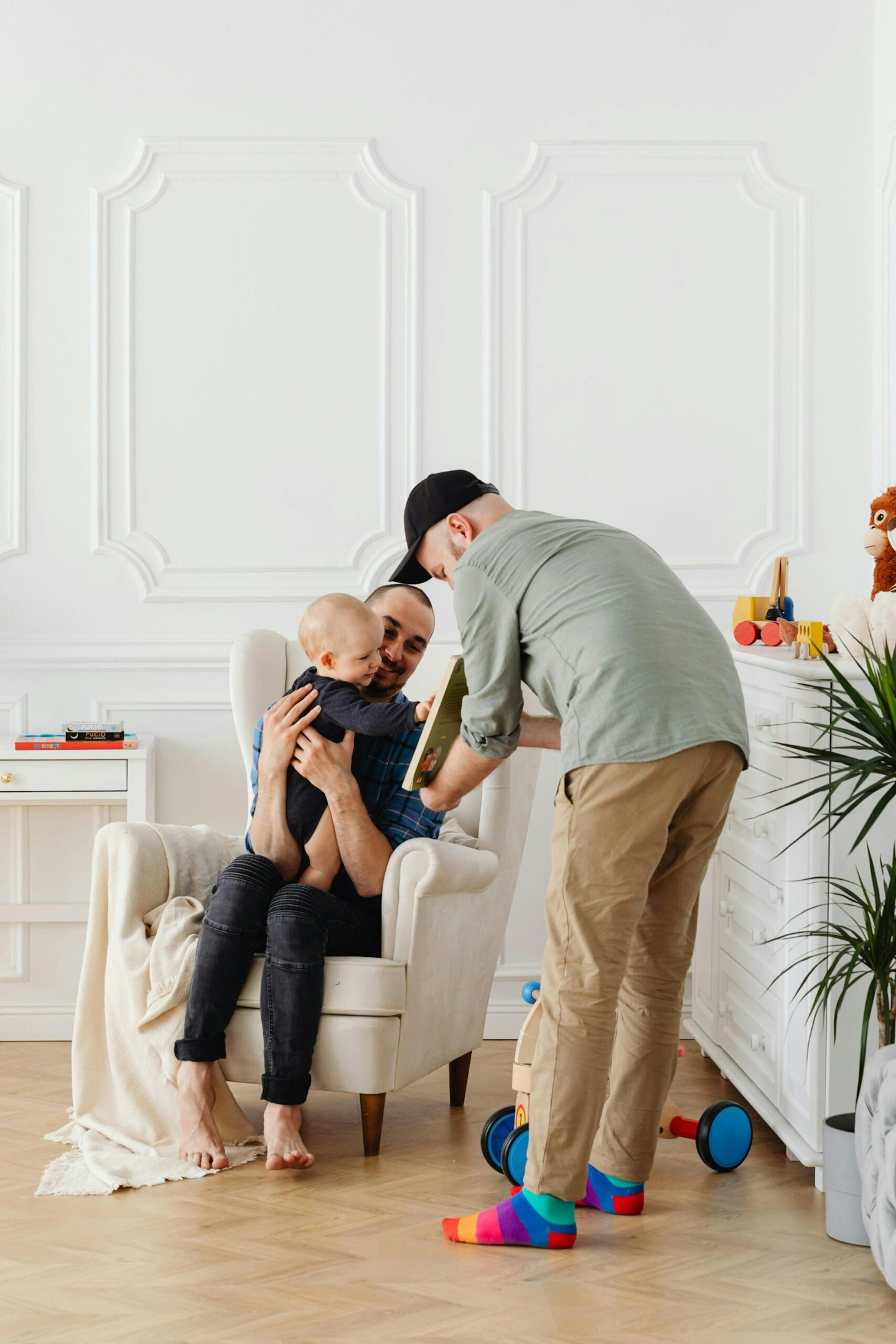Remember the days when romancing your partner felt effortless? You both had endless energy for each other: exchanging kisses and warm hugs, going on spontaneous dates, and engaging in deep conversations over dinner. And then, your little one arrived; suddenly, everything changed. Sleepless nights, new responsibilities and rowing over nappies replaced those sweet moments. Mornings blur into nights, and even a simple "good morning" becomes a rarity. Cue feelings of frustration, guilt and distress for both parents.
“A child bonds a couple for the rest of their lives, so there are many ways in which parenthood makes a relationship stronger and deeper,” Jill Barnett Kaufman, relationship counsellor says. “But you also take on new and different roles when you become a parent, so it’s absolutely normal for couples to go through a period of flux, when the nature of your relationship, and what you need from one another, changes.”
Mother&Baby turned to relationship experts to understand the reasons behind this disconnection and learn how addressing it can help you and your partner rekindle your lost romance. Here’s why this happens and what you can do about it.

The reason why couples feel disconnected and less happy after they become parents
Becoming a parent is both beautiful and dreadful. Ask any parent, and they’d say it’s the best thing that ever happened to them; given the chance, they’d do it all over again. However, it does come with its fair share of challenges and can be all-consuming.
Feeling disconnected from your partner after having a baby is more common than you think. Research shows a staggering 92% increase in couple conflict during the first year of having a baby, with up to 67% of couplesreporting a decline in relationship satisfaction in the first three years postpartum.
According to Paula Sheridan, career coach and founder of Unwrapping Potential, having a baby can "test even the most rock-solid relationships."
Not getting enough sleep, having a load of new responsibilities, constantly feeling 'on duty,' and the stress of caring for a baby can make couples cranky and lead to more arguments, leaving one or both partners feeling drained and tired, eventually putting a strain on their relationship.
It's a tough time for new parents as they try to handle their new roles and keep their relationship strong. "Babies rely on us completely for their survival, so it reshapes our priorities. Before, we focused on each other’s emotional needs, but now all our attention goes to our baby," Tasha Bailey, accredited psychotherapist and author says. "Your relationship is entering a new phase, and that might mean changing some of the foundations so that it can work better."
Relationship after baby: 12 expert tips to rekindle your lost romance

1. Create a no-blame culture
As new parents struggling with constant fatigue, it’s easy to start blaming each other when the baby is crying, not sleeping, or not eating well. Those 3 a.m. wake-up calls when you’re both exhausted can lead to frustration and finger-pointing. But creating a no-blame culture early on can help you feel like a team.
"Caring for a newborn can be really tiring and taxing, especially with the lack of sleep and all the stress. It's common to feel less social and affectionate," Tasha explains. "Our brains are often focused on just getting through each task, like we're in survival mode.”
Researchers say poor sleep can lead to increased aggression, making even small things a trigger. Daily tasks can become major sources of frustration, stress and anxiety, which might explain those unusual yelling fits or frantic moments you have around your partner.
Paula recommends talking things through. “Remember, it's not about making your partner 'lose' an argument. The point isn't to 'win,' but to find solutions together and be a team."
Understanding that you're both doing your best under tough circumstances helps maintain mutual respect.
“In those tricky little life moments, adopting the word ‘we’ makes it clear you’re a team. Ask, ‘What are we going to do about this?’ The aim is not to avoid conflict,” Jill says, “but to manage it well. Working out problems together will make you stronger as a couple.”
2. Create a safe place to speak freely, without judgment
Open and honest conversations with your partner, free from any restrictions or judgment, are incredibly freeing. We know postpartum women can get moody and, sometimes, we can be crazy ourselves. Knowing you won't be judged allows you both to explore and discuss topics like sudden mood changes, such as feeling angrier than usual, which can be attributed to postpartum rage or hormonal imbalances like baby blues.
It's important not to keep these feelings bottled up, as they can build up over time. "Directly after birth, new mums go through huge hormonal changes," Jill says. "The dramatic drop in your estrogen and progesterone levels can leave you feeling euphoric one moment and weepy the next."
These postpartum hormone changes can sometimes have a negative impact on mood. When you share what you're experiencing with your partner, it helps them understand and support you better through these changes.
Not communicating can leave your partner confused and disconnected from your new reality. Simply letting them know how you're feeling, such as saying, "I'm feeling pretty fragile today," can improve communication and prevent unnecessary misunderstandings.
Tasha suggests having daily check-ins, “Have the chance to really check-in with each other, with a deep-dive about how you are both feeling as individuals, as parents and as partners. End each check-in by making a request of one thing that you need from each other for the week ahead. Whether it be more physical touch, more compliments or a chance to rant together when you need it.”
3. Give your partner the benefit of the doubt

New parents might feel disconnected because they often assume things about each other rather than trying to understand what happened.
As Paula explains, "We often see the facts of a situation and make up a story about them that seems true to us. But our partner might see things differently, and their version feels just as real to them. These different stories can lead to argumentsor not paying attention to each other's needs. To avoid getting upset, we should separate the facts from the stories we tell ourselves.
For example, instead of assuming your partner is leaving everything for you to do, which could cause conflict, it's better to share facts like ‘I've been handling all the meals and bathtimes this week’ and explain how it makes you feel, like ‘it seems like you're avoiding these tasks to take it easy.’
By giving your partner the benefit of the doubt, you might realise they have reasons for not helping out, like feeling overwhelmed or misunderstanding previous attempts. Understanding each other's perspectives can uncover reasons behind actions, like ‘last time I did it, you said I did it wrong and were upset, so I thought you'd rather do it this time.’”
4. Schedule a non negotiable couple time everyday
Make it a daily habit to unwind with your partner. Whether it’s enjoying a quiet cup of coffee in the morning after dropping off your little one at nursery or sharing a delicious home-cooked meal while watching a limited series after putting the baby to sleep, these moments are precious.
“Creating a daily ritual just for the two of you, like having breakfast together or cuddling in the evening, can strengthen your bond and remind you both of the importance of your relationship. It’s also a chance to give each other the affirmation and care you both deserve,” Tasha says.
5. Compliment each other
“Everybody needs to hear that they are valued by the people they care about, but this is particularly the case for parents,” Jill says. “In the first years of parenthood, we often doubt our abilities. It’s very powerful to hear your partner telling you you’re doing a great job.” Be specific: saying, ‘I love how gentle you are when you dress him’ is much more powerful than ‘You’re a great Dad.’”
Jill adds, “Sometimes the parent who stays home with the kids doesn’t get the praise they used to from working outside the house, and they might feel like their efforts are taken for granted. Or the parent who goes out to work may feel new pressure and stress about providing for the family.”
Taking a moment each day to say something nice to your partner can really lift both of your spirits when things get hectic with parenting. Whether it’s telling them they did a great job putting the kids to bed, thanking them for staying calm during a toddler meltdown, or noticing how they make the baby laugh, these little compliments mean a lot. Even a simple compliment about their outfit or a sincere 'thank you' for their help can make a big difference.
6. Don't underestimate the power of oxytocin

Research finds that asking for a hug isn't such a bad idea when life feels out of control. A hug can make someone feel happier by making them feel less lonely and helping to reduce stress. So make it a habit of having a power hug when life gets too overwhelming and stay in your partner's arm for a minute or two.
“Showing affection through touch and encouraging words is just as important for feeling close to each other as physical intimacy. Try taking turns to hold hands, give compliments about their appearance, or praise how they handle parenting tasks. These moments of connection can bring you closer together in a meaningful way,” Tasha says.
If you find your emotions are running low, try putting your baby in your partner's arms and see how they interact. Even better, have Dad wear the baby in a sling and take a walk together – you'll naturally find yourself giving them both plenty of hugs along the way.
7. Spare yourselves from parental burnout and share the workload

Did you know that eight out of 10 British parents experience parental burnout? Even new parents aren't spared; just a few months into parenthood, you might start feeling physically, mentally, and emotionally exhausted. It’s the kind of tiredness where no amount of sleep seems to make a difference, leaving you feeling completely drained every morning.
The key to combating this is sharing the workload. No parent should have to do it all alone. It's about understanding who does what and making sure responsibilities are shared. Paula emphasises, “Resentment builds up when one person feels they do more than the other, and conflicts arise from unspoken expectations and assumptions about 'me' time.”
“There are ways to address these challenges, and it all comes down to communication,” Paula advises. Here are some important questions to discuss:
-
What were your expectations about parenthood?
-
How do you plan to divide the work?
-
What are your individual needs?
Ideally, these conversations happen before you become parents, but in reality, they often happen after the baby arrives.
Jill points out, “Once you’re past those early days, it’s common for one partner to end up doing most of the childcare, especially if they’re on maternity or paternity leave. This shift can really affect your relationship, so it’s important to talk about how it’s impacting both of you.”
Having a chat might not sound like the most romantic evening, but sitting down together to split up household and childcare tasks can really help keep things smooth between you. You might not get everything perfectly balanced, and that’s okay. What’s important is that you work together to create a plan that prevents any bad feelings from creeping in.
“A healthy relationship is one in which you voice your feelings and needs before they explode, in a respectful way. And the result of all this teamwork? It will make the two of you a far stronger unit, capable of moving mountains, withstanding earthquakes and even changing nappies at 3 a.m. in the morning!” Jill says.
8. Give your partner personal some me-time
By delegating tasks, you give your partner the gift of personal time. This could mean a few extra minutes in the shower, going for a run, watching a movie in the cinema (solo outings can be refreshing!), or anything else they enjoy.
According to research, 82% say that getting the right amount of 'personal time' actually strengthens their relationship.
Taking time for yourself allows you to pursue your interests, focus on your individuality, and gives you space to gather your thoughts. It also enhances communication between you and your partner.
9. Encourage social life outside of family life, go on a mum’s or dad’s night out once in a while
A recent study from The Ohio State University reveals that approximately 62% of mums and dads feel lonely due to the demands of modern parenting. Four out of five parents express a desire to connect with others outside of their work and home responsibilities.
It’s important to recognise that needing time for yourself, apart from caring for your baby or partner, is not selfish. We all benefit from occasional breaks to recharge and maintain a sense of individual identity.
Arranging a night out where one parent stays home to look after the baby while the other enjoys time with friends can be rejuvenating.
10. Don’t make your partner feel like a third wheel

If one parent falls ill, the other might end up taking on all the baby duties. In the past, when you were unwell, you probably got comfort and care, like warm soup and attention. But now, with a demanding baby, you might still have to handle childcare while dealing with a cough or fever on top of it. This can really make you feel frustrated.
"Feeling like a third wheel can happen when one parent feels neglected or left out within the family," Tasha explains, "Some partners may feel like they're being ignored because all the focus is on the new baby."
"Who else can lend a hand so you can get some 'me' time? Extended families are usually more than willing to help out. Taking some time for yourself will give you the energy boost you need," Paula advises.
But if you don’t have family nearby, make sure you take care of your sick partner by giving them some time off and showing them you care.
11. Make time for physical intimacy
While it’s important to stay connected with your partner after having a baby, it doesn’t always have to be about sex. A recent study found that 33% of women still experienced painful intercourse one year to 18 months after childbirth. It’s important to talk to your partner about your needs—whether those involve finding time for sexual intimacy or not—so that you can understand each other’s perspectives and work towards a compromise.
“After giving birth and adjusting to having a baby around, our physical and sexual boundaries can change. It can be helpful to talk about these changes together and maybe try a quiz on sexual boundaries or read books about sex and relationships. In my book, Real Talk, I have an exercise for couples to explore what turns them on and what might slow things down, which can help make sex feel safer and more intimate,” Tasha says.
12. Be intentional in your partnership
Studies suggest that many of us stop saying and doing the little things that make each other happy after having kids. But this should not be the case if you really want to make it work.
"Baby talk isn't very sexy. Make space to have conversations where you don't talk about baby at all, but as each other as individuals and as a couple. Make an effort to be curious about each other all over again," Tasha says.
It's all about those little things that speak volumes. Take the time to really know your partner—what makes them light up, what brings them comfort. Whether it's sneaking in a dinner date with a snoozing baby in tow or surprising them with small treats that make their day, these gestures of thoughtfulness matter.
Parenthood is this incredible mix of joy and challenges. It's fulfilling beyond measure, but it can also be overwhelming at times. But even beyond this, remember to see each other.
Paula says, “It's easy to get wrapped up in meeting our baby's needs and forget to nurture our relationship as partners.”
So, be intentional about staying connected. Stay curious about each other's thoughts and feelings. Work together as a team, face parenthood's hurdles hand in hand. Keep that spark alive by appreciating each other every day. A simple "thank you," a heartfelt compliment, or a spontaneous hug—these make a world of difference. Don't let a day pass without letting your partner know how much they mean to you.
About the author
Jill Barnett Kaufman is a compassionate relationship counsellor, certified parent educator, and cognitive-behavioural therapist. She specialises in guiding clients through difficult and overwhelming situations, helping them discover new ways to enhance their happiness and peace. Jill's supportive and insightful approach empowers individuals to transform their lives for the better.
Tasha Bailey is an accredited psychotherapist and author specialising in trauma, self-love, and creativity in therapy. She has become a prominent voice on social media, advocating for open discussions on mental health, healing, and self-care. Tasha’s approach aims to make these conversations more dynamic, inclusive, and relevant.
Paula Sheridan, a career coach and the founder of Unwrapping Potential, is dedicated to helping women recognise and communicate their value effectively, both at home and in the workplace. She is passionate about empowering women to understand their worth and contributions, ensuring their needs are met.
Anne Lora Scagliusi is a Senior Digital Writer at Mother & Baby. She is a Scotland-based journalist with over a decade of international writing experience, specialising in women’s health, maternal mental health, and wellness. Her work has been featured in Vanity Fair, Marie Claire, and Glamour and has appeared on several Vogue global editions.She is mum to a one-year-old bambino and lives between Italy and the UK. You can follow her on Instagram.
